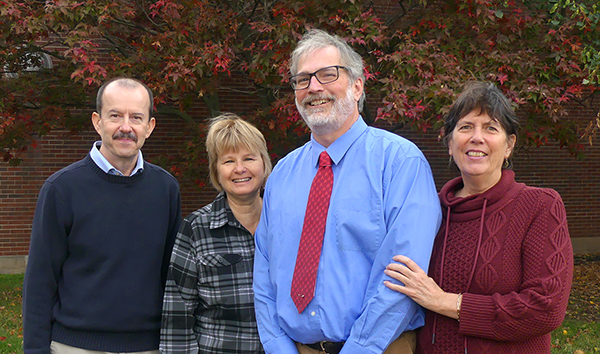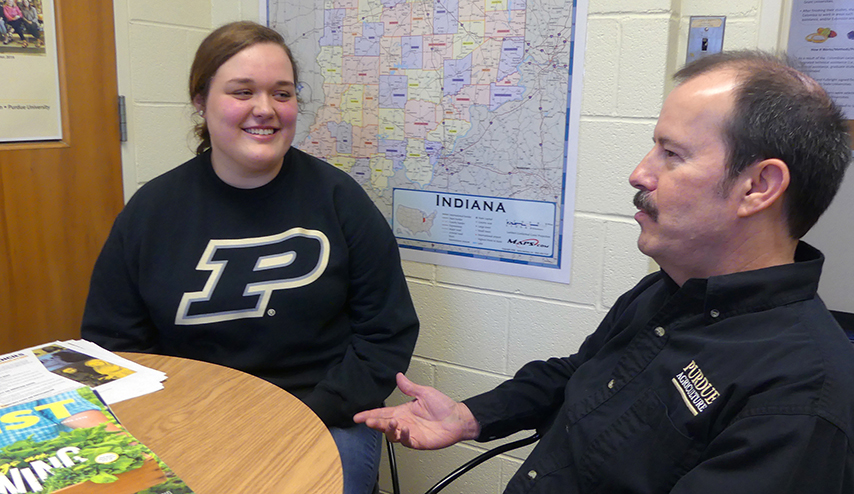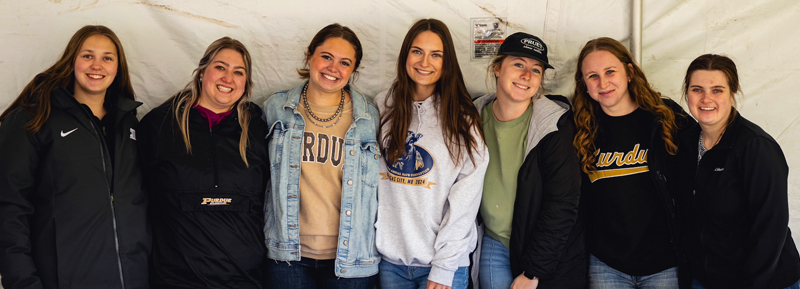Agricultural and Natural Resources Communication prepares you for a career that combines marketable communication skills with an appreciation and knowledge of agriculture and our land and water resources.
Employers value this combination of skills and seek our students for internships and full-time jobs, with starting salaries that average more than $50,000. Our graduates promote awareness and understanding of food, agriculture, natural resources, and science through a variety of career paths, including agricultural organizations, agribusiness firms, government, mass media, and advertising and public relations agencies.
LOCATION & MAILING ADDRESS
Agricultural and Natural Resources Communication
615 Mitch Daniels Blvd
West Lafayette, IN 47907
765-494-8423
E-mail
Our Program
A STRONG CAREER OUTLOOK
Careers in Agricultural and Natural Resources Communication look promising for those with the right skills. According to a USDA-National Institute of Food and Agriculture report, communication specialists in agriculture and science should see favorable job markets, especially those with experience in digital and electronic media management. Demand for social media expertise will remain strong.
Recent graduates from our department enjoyed starting salaries averaging $50,176, according to Purdue Data Digest for 2024. Graduates who are flexible in seeking employment may find even higher salaries. According to the U.S. Bureau of Labor Statistics, the median national salary in 2022 for entry-level public relations positions exceeded $67,000, and the median pay for those in film and video editing exceeded $62,000.
MANY PATHS TO SUCCESS
In addition to our first-year Agricultural and Natural Resources Communication (AGCM) majors, many students transfer to our program or add AGCM as a second major.
Transferring to AGCM from other Purdue Agriculture majors can be easy. We also work closely with students who transfer from other Purdue colleges as well as other institutions.
If you are already a Purdue student, consider adding Agricultural and Natural Resources Communication as a second major. Our plan of study complements most College of Agriculture majors (and many other majors across the University). Adding an AGCM major can develop valuable skills that will give you advantages in your career.
A SUPPORTIVE COMMUNITY
Although part of a large university, the Purdue Agricultural and Natural Resources Communication program offers a small, close-knit community. Some benefits of our program include personalized advising, small class sizes, and individual attention to help you achieve your career goals.
If you would like to play an influential role in that change, Agricultural and Natural Resources Communication could be just the career choice for you.
Agricultural Communication was first offered as a degree option at Purdue University in 1971. From its inception, the academic program has emphasized personalized student advising, flexible course options, and a solid foundation in science and agriculture. Over the past 50 years, more than 200 graduates of our program have served industry through successful careers in public relations, journalism, agribusiness, government, and marketing.
 (From left) The Purdue Agricultural Communication teaching group: Dr. Mark Tucker, Beth Forbes, Kevin Leigh Smith, and Dr. Linda Pfeiffer.
(From left) The Purdue Agricultural Communication teaching group: Dr. Mark Tucker, Beth Forbes, Kevin Leigh Smith, and Dr. Linda Pfeiffer.
In our program, students learn from world-league faculty and instructors in the Purdue College of Agriculture and the Brian Lamb School of Communication. There are four members of our Agricultural Communication teaching staff.
Our People

Beth Forbes
Director of Science Communication and Continuing Lecturer
forbes@purdue.edu
Beth Forbes is the Purdue Agriculture Director of Science Communication and a Continuing Lecturer. She teaches ASEC 10100 (Agriculture, Science and Social Issues), ASEC 35500 (Controversial Science & Media in the Public Sphere), and ASEC 38500 (Communication Strategies for Controversial Issues in ANR).
Forbes helps Purdue Agriculture faculty, staff, and students communicate science information more effectively to the public.

Dr. Linda Pfeiffer
Associate Professor of Agricultural Sciences Education and Communication
lpfeiff@purdue.edu
Dr. Linda Pfeiffer is an Associate Professor of Agricultural Sciences Education and Communication. She teaches ASEC 35500 (Controversial Science & Media in the Public Sphere), ASEC 38500 (Communication Strategies for Controversial Issues Engagement), ASEC 48000 (Agricultural Communication Capstone Seminar), ASEC 48500 (Environmental Communication), ASEC 58500 (Science Communications), and other courses.
Dr. Pfeiffer's research interests center on communicating complex science to the public.

Kevin Leigh Smith
Academic Advisor, Continuing Lecturer, and Communication Specialist
smith79@purdue.edu
Kevin Leigh Smith is the primary academic advisor in Agricultural and Natural Resources Communication. Please contact him if you have questions about the major — including Purdue 101/All Aboard, campus visits, and registration. Smith is also the person to contact if you wish to receive credit for communication internships.
Smith teaches ASEC 25000 (Storytelling for Professional Communication), ASEC 28000 (Digital Storytelling), AGR 12100 (Introduction to Agricultural Sciences Education and Communication Academic Programs), and ASEC 59500 (Internship in Agricultural Sciences Education and Communication).

Dr. Mark Tucker
Professor of Agricultural Sciences Education and Communication and the coordinator of the Agricultural and Natural Resources Communication program
matucker@purdue.edu
Dr. Mark Tucker is a Professor of Agricultural Sciences Education and Communication and coordinator of the Agricultural and Natural Resources Communication program. He teaches ASEC 15200 (Agricultural Communication Seminar), ASEC 28500 (Introduction to Publication Design), ASEC 48000 (Agricultural Communication Capstone Seminar), ASEC 54600 (Communication and Issues Engagement for Agricultural Professionals), and ASEC 54800 (Communicating Science to the Public). Dr. Tucker holds a courtesy appointment in the Brian Lamb School of Communication
In addition to teaching, Dr. Tucker advises Agricultural and Natural Resources Communication students and serves as faculty advisor to the Agricultural Communicators of Tomorrow (ACT) student organization.
Students in the Purdue Agricultural and Natural Resources Communication Program will learn and understand a core set of three principles that we emphasize throughout our curriculum. These principles are the hallmarks of what we believe makes an effective graduate and communication professional.
Purdue Agricultural and Natural Resources Communication graduates will be able to:
WRITE AND COMMUNICATE ACROSS MEDIA
- Write competently in many styles, including the various forms of news, research, features, and public relations.
- Communicate with a range of audiences, including lay audiences, skeptical audiences, youth, and various industries.
- Compose and design messages for a range of traditional and emerging media, including print, web, and social.
- Communicate visually in a range of media, including photography, basic graphic design, and video.
THINK CRITICALLY AND UNDERSTAND SCIENCE
- Provide audience- and client-based solutions to complex communication problems.
- Understand and effectively communicate complex scientific and technological topics to many audiences.
- Have a keen grasp of what constitutes sound scientific principles, including standards of evidence and the nature of scientific inquiry.
DEMONSTRATE ETHICS AND PROFESSIONALISM
- Identify and verify credible and accurate sources.
- Identify different sources that reflect the clients and audiences they serve.
- Conduct oneself professionally with colleagues, clients, sources, and the public.
- Commit to lifelong learning about science, communication, and audiences.
Agricultural and Natural Resources Communication students with specific professional goals may focus their coursework in one or more of these broad career categories:
- Community Outreach/Extension
- Natural Resources/Environmental Communication
- News/Content Creation
- Policy/Advocacy
- Public Relations/Marketing
Students may also pick and choose among communication courses for a more general communications curriculum.
*Agricultural and Natural Resources Communication has no official concentrations, so these categories and course offerings are not a complete list of career opportunities, and not all courses are offered every semester (or even every year), and prerequisites and restrictions can change at any time.
Courses with these designations fulfill major, college, or core curriculum requirements:
AGCM = May count as Communication and ANR Communication Selective
ANR = May count as an Agricultural and Natural Resources Selective
HUM = May count as a Humanities course
INT = May count as International Understanding
MATH = May satisfy the College of Agriculture’s additional mathematics and/or science requirement
SS = May count as a Social Sciences course
STS = May count as a Science, Technology, and Society course
†Denotes a course with a temporary number but has been offered multiple times.
COMMUNITY OUTREACH/EXTENSION
Select courses from Community Outreach/Extension if you are interested in a career in university extension, community or public engagement, informal education or outreach, or agritourism.
If you are interested in this area, we strongly encourage you to consider a minor in the College of Agriculture that will help satisfy the 21 Agricultural and Natural Resources Selective credits required for our major. Some minors include Animal Science, Food and Agribusiness Management, Natural Resources and Environmental Sciences, Crop Science, Soil Science, Plant Biology, Digital Natural Resources, Forest Ecosystems, Urban Forestry, and Sustainable Food and Farming Systems.
ASEC/COM 28500 (Introduction to Publication Design) — AGCM, ANR
ASEC 28000 (Digital Storytelling) — AGCM, ANR
ASEC 30100 (Building Intercultural Partnerships) — AGCM, ANR, HUM, INT
ASEC 34100 (Curriculum Development in Agricultural Education) (2) — ANR
ASEC 35500 (Controversial Science and Media in The Public Sphere) — AGCM, ANR, STS, HUM
ASEC 48500 (Environmental Communication) — AGCM, ANR
ASEC 54500 (Teaching STEM Through AFNR) — ANR
ASEC 55000 (Program Evaluation) (ag selective) — ANR
ASEC 58500 (Science Communication) — AGCM, ANR
AGEC 40600 (Natural Resource and Environmental Economics) — ANR
AGEC 41100 (Agricultural Policy) — ANR
AGEC 45500 (Agricultural Law) — ANR
COM 25300 (Introduction to Public Relations) — AGCM
COM 27100 (Podcasting) — AGCM
COM 30300 (Intercultural Communication) — AGCM
COM 49504 (Social Media for Social Good) — AGCM
ENGL 42100 (Technical Writing) — AGCM
ENGL 43300 (Proposals and Grants) — AGCM
POL 22300 (Introduction to Environmental Policy) — HUM, STS
POL 32700 (Global Green Politics) — HUM, INT
POL 37200 (Indiana Government & Politics) — SS
NATURAL RESOURCES/ENVIRONMENTAL COMMUNICATION
Select courses from Natural Resources/Environment if you are interested in soil science, conservation, sustainability, hydrology, environmental impact analysis, ecology, and environmental policy. You may be interested in a career in the environment, natural resources management, public engagement, informal education or outreach, agritourism, and more.
If you are interested in this area, we strongly encourage you to consider a minor in the College of Agriculture that will help satisfy the 21 Agricultural and Natural Resources Selective credits required for our major. Some minors include Natural Resources and Environmental Sciences, Aquatic Science, Digital Natural Resources, Forest Ecosystems, Urban Forestry, Wildlife Science, and Sustainable Food and Farming Systems. Beyond being grounded in these subject areas, you should also decide what area of the communication profession you are most interested in (Community Outreach/Extension, News/Content Creation, Policy/Advocacy, Public Relations/Marketing) and select Agricultural and Natural Resources Communication selectives in these areas.
ASEC/COM 28500 (Introduction to Publication Design) — AGCM, ANR
ASEC 28000 (Digital Storytelling) — AGCM, ANR
ASEC 30100 (Building Intercultural Partnerships) — AGCM, ANR, HUM, INT
ASEC 34100 (Curriculum Development in Agricultural Education) (2) — ANR
ASEC 35500 (Controversial Science and Media in The Public Sphere) — AGCM, ANR, STS, HUM
ASEC 48500 (Environmental Communication) — AGCM, ANR
ASEC 58500 (Science Communication) — AGCM, ANR
AGEC 40600 (Natural Resource and Environmental Economics) — ANR
AGEC 52500 (Environmental Policy Analysis) — ANR
COM 25300 (Introduction to Public Relations) — AGCM
COM 27100 (Podcasting) — AGCM
COM 49504 (Social Media for Social Good) — AGCM
ENGL 42100 (Technical Writing) — AGCM
ENGL 43300 (Proposals and Grants) — AGCM
FNR 37500 (Human Dimensions of Natural Resource Management) — ANR
POL 22300 (Introduction to Environmental Policy) — HUM, STS
NRES 12500/AGRY 12500/FNR 12500/EAPS 12500 (Environmental Science and Conservation) — STS, MATH, ANR
POL 32700 (Global Green Politics) — HUM, INT
POL 37200 (Indiana Government & Politics) — SS
SOC 34400 (Environmental Sociology) — SS
NEWS/CONTENT CREATION
Select courses from News/Content Creation if you are interested in a career in message design, writing, broadcast or social media management for news media, or an agricultural or natural resource business or organization.
ASEC/COM 28500 (Introduction to Publication Design) — AGCM, ANR
ASEC 28000 (Digital Storytelling) — AGCM, ANR
ASEC 35500 (Controversial Science and Media in the Public Sphere) — AGCM, ANR, HUM, STS
ASEC 48500 (Environmental Communication) — AGCM, ANR
ASEC 58500 (Science Communication) — AGCM, ANR
COM 27100 (Podcasting) — AGCM
COM 31100 (Copy Editing) — AGCM
COM 33200 (Television Production) — AGCM
COM 35100 (Mass Communication Ethics) — AGCM
COM 35200 (Mass Communication Law) — AGCM
COM 36100 (Multiplatform Journalism) — AGCM
COM 36200 (Broadcast Performance) — AGCM
COM 40700 (Introduction to New Media/Social Media Production) — AGCM
COM 40800 (News Magazine Production) — AGCM
COM 40900 (Video Journalism) — AGCM
COM 43500 (Communication and Emerging Technologies) — AGCM
COM 49504 (Social Media for Social Good) — AGCM
COM 49500CCSM (Content Creation for Social Media Influencers) — AGCM
ENGL 41900 (Multimedia Writing) — AGCM
ENGL 43400 (Science and Medical Writing) — AGCM
ENGL 40600 (Review Writing) — AGCM
ENGL 42400 (Writing for High Technology Industries) — AGCM
POLICY/ADVOCACY
Select courses from Policy/Advocacy if you are interested in a career in agricultural or environmental policy development, public service, or advocacy with an organization, business, or government agency.
ASEC/COM 28500 (Introduction to Publication Design) — AGCM, ANR
ASEC 28000 (Digital Storytelling) — AGCM, ANR
ASEC 35500 (Controversial Science and Media in the Public Sphere) — AGCM, ANR, STS, HUM
ASEC 48500 (Environmental Communication) — AGCM, ANR
ASEC 58500 (Science Communication) — AGCM, ANR
AGEC 40600 (Natural Resource and Environmental Economics) — ANR
AGEC 41100 (Agricultural Policy) — ANR
AGEC 45500 (Agricultural Law) — ANR
COM 25300 (Introduction to Public Relations) — AGCM
COM 25700 (Public Relations Techniques) — AGCM
COM 30300 (Intercultural Communication) — AGCM
COM 31400 (Advanced Presentational Speaking) — AGCM
COM 41600/POL 41500 (United States Politics and the Media) — AGCM, SS
COM 43500 (Communication and Emerging Technology) — AGCM
COM 44400 (Introduction to Communication and Social Entrepreneurship) — AGCM
COM 46400 (American Political Communication) — AGCM
COM 49500† (Risk Communication) — AGCM
COM 49500† (Public Affairs) — AGCM
COM 49500CCSM (Content Creation for Social Media Influencers) — AGCM
COM 49504 (Social Media for Social Good) — AGCM
ENGL 43300 (Proposals and Grants) — AGCM
POL 22300 (Introduction to Environmental Policy) — SS, STS
POL 32700 (Global Green Politics) — SS, INT
POL 37200 (Indiana Government & Politics) — SS
PUBLIC RELATIONS/MARKETING
Select courses from Public Relations/Marketing if you are interested in a career in public relations, marketing, or strategic communication with a business, organization, or agency.
ASEC/COM 28500 (Introduction to Publication Design) — AGCM, ANR
ASEC 28000 (Digital Storytelling) — AGCM, ANR
ASEC 35500 (Controversial Science and Media in the Public Sphere) — AGCM, ANR, STS, HUM
COM 25300 (Introduction to Public Relations) — AGCM
COM 25600 (Introduction to Advertising) — AGCM
COM 25700 (Public Relations Techniques) — AGCM
COM 27100 (Podcasting) — AGCM
COM 31100 (Copy Editing) — AGCM
COM 31400 (Advanced Presentational Speaking) — AGCM
COM 32000 (Small Group Communication) — AGCM
COM 32400 (Introduction to Organizational Communication) — AGCM
COM 33200 (Television Production) — AGCM
COM 33600 (Advertising Media Strategy) — AGCM
COM 33701 (Producing Digital Advertising) — AGCM
COM 35300 (Problems in Public Relations) — AGCM
COM 40700 (Introduction to New Media/Social Media Production) — AGCM
COM 43500 (Communication and Emerging Technology) — AGCM
COM 45600 (Advertising Writing) — AGCM
COM 49500† (Risk Communication) — AGCM
COM 49500CCSM (Content Creation for Social Media Influencers) — AGCM
COM 49501 (Sports Media Relations) — AGCM
COM 49504 (Social Media for Social Good) — AGCM
The Purdue Agricultural and Natural Resources Communication program recognizes the value of experiential learning that can occur with supervised internships.
Our students engage in a variety of internships with a wide range of employers — from full-service communication firms to state agencies to agricultural companies, and many more. Our students have completed internships with notable organizations, including Farm Credit Mid-America, Northern International Livestock Exhibition, BASF, Indiana Farm Bureau, the USDA, Purdue Extension, Indiana FFA Foundation, and the Indiana State Department of Agriculture, among others.
 Student internships are a great way to learn and hone valuable skills. Students may also earn credit for their experiences.
Student internships are a great way to learn and hone valuable skills. Students may also earn credit for their experiences.
EARNING CREDIT FOR INTERNSHIPS
The number of credits you can earn from an internship is based on the work you perform for the internship course. Not every work experience meets the requirements for internship credit. Your instructor will determine the number of credits earned. Most internships earn 1 credit. This course may be repeated with different internships for additional credit.
Internships for Purdue credit will appear on your official transcript as ASEC 59500 (Internship in Agricultural Sciences Education and Communication). There are two prerequisites for the course. First, you must have the instructor's permission before starting an internship. Second, you must have earned a grade of C or better in ASEC 15200.
Internships can be counted toward your plan of study as Communication/ANR Communication Selective credit or as Agricultural and Natural Resources Selective credit. For specific details, including requirements before, during, and after the internship, contact Kevin Leigh Smith.
Undergraduate students may not always know there are opportunities to learn about and conduct research as part of their major.
We in Agricultural and Natural Resources Communication believe that all students benefit professionally and become more marketable by gaining research experience. Students who engage in undergraduate research are more likely to graduate, pursue graduate school, and have more successful careers following graduation. Students in the Purdue Agriculture Dean’s Scholars Program or the Purdue John Martinson Honors College may be required to complete a research project as part of their program requirements.
Agricultural and Natural Resources Communication students have many options to pursue research in our specialized field!
 Undergraduate research in agricultural communication aims to provide students with valuable experience and skills that will help them after graduation.
Undergraduate research in agricultural communication aims to provide students with valuable experience and skills that will help them after graduation.
Research in our field is a specialized type of social science research that focuses on gaining a deeper understanding of individuals, audiences, perceptions, and behaviors. Professionals in agricultural and natural resources communication — web designers, public relations managers, broadcasters, editors — routinely use communication and marketing research to guide their decision-making and evaluate their efforts.
As part of your undergraduate research experience, you will learn about various research methods and their proper use. You will also have opportunities to present your study findings to others as well as to publish your work in the Journal of Purdue Undergraduate Research.
See your AGCM academic advisor to explore opportunities and learn more.

Agricultural Communicators of Tomorrow—Purdue Chapter
The Purdue chapter of Agricultural Communicators of Tomorrow (ACT) follows the mission of the national organization:
- To build relationships among agricultural communication professionals, college students, and faculty
- To provide professional and academic development for members
- To promote agriculture through communications efforts
We welcome students from all majors to attend our meetings and participate in our activities.
Please email us with any questions about the club, including how to join. Visit our chapter's site.
This page provides links to helpful documents and other websites for current and prospective students.
Agricultural and Natural Resources Communication Program
Agricultural and Natural Resources Communication degree requirements from the Purdue Registrar
Agricultural and Natural Resources Communication Program Checklist and Sample Four-year Plan of Study
Agricultural and Natural Resources Communication Degree in 3
Purdue Agricultural and Natural Resources Communication Core Competencies
Internship Credit Requirements
All Purdue University majors & minors
tuition
Costs vary depending on factors such as where a student chooses to live, travel expenses, food costs, enrollment in a specific program, scholarships, and so on. Here are some tools to help you learn more.
Tuition and Fees (Purdue Division of Financial Aid)
Tuition Calculator (Purdue Bursar)
Costs & Financial Aid (Purdue Division of Financial Aid)
Help, Advising, and Careers
BoilerConnect (requires login)
Purdue Agriculture Office of Academic Programs
myPurdue (requires login)
College of Agriculture Core Graduation Requirements (see navigation for details about Humanities and/or Social Sciences, International Understanding, Mathematics and Science, Multicultural Awareness, and Written and Oral Communication requirements)
Purdue College of Agriculture Career Services
Purdue Center for Career Opportunities
Purdue Disability Resource Center
Purdue Academic Success Center
Math Resource Room
Chemistry Resource Room
Biology Help Room
Excused Absence Policy (Dean of Students)
Student Life
Agricultural Communicators of Tomorrow (ACT)
Purdue Agriculture Student Organizations
Purdue University Student Organizations
Purdue International Programs in Agriculture
social mediA
Our social media handle for Instagram, X, Facebook, YouTube, and Bluesky is @PurdueASEC

